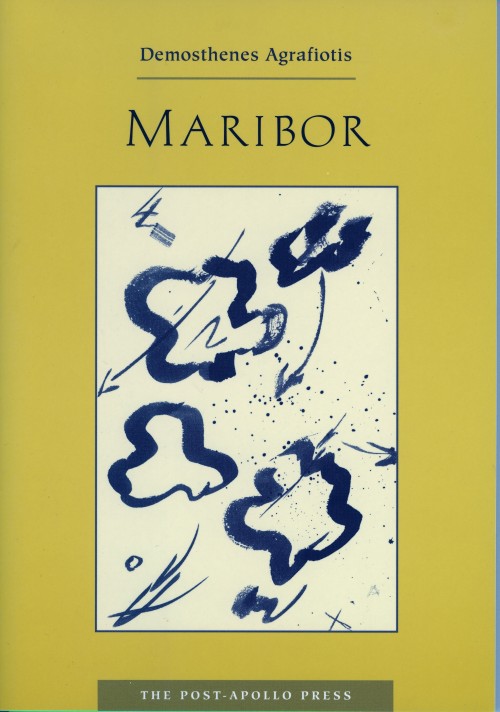 Post-Apollo Press was founded in Sausolito, CA in 1982. They’ve published a number of poets, including Lyn Hejinian, Barbara Guest, Tom Raworth (one of my faves), Leslie Scalapino and recently, Demosthenes Agrafiotis (translated by John Sakkis, an always level-headed htmlgiant commenter, and his uncle Angelos Sakkis). This description of how the collaborative translation worked is beautifully written, very California, which is where these guys are from. What’s most compelling to me there is how Angelos confronted the poetry. He writes, “I take a look and I am completely nonplused perplexed bewildered not the kind of thing I usually read by choice still the specificity of the language keeps me hooked I struggle with it word by word line by line all the while thinking hey I can read Greek but what is this guy saying here where is he going with this the ellipticity of it,” which is about how I feel as I encounter the poems.
Post-Apollo Press was founded in Sausolito, CA in 1982. They’ve published a number of poets, including Lyn Hejinian, Barbara Guest, Tom Raworth (one of my faves), Leslie Scalapino and recently, Demosthenes Agrafiotis (translated by John Sakkis, an always level-headed htmlgiant commenter, and his uncle Angelos Sakkis). This description of how the collaborative translation worked is beautifully written, very California, which is where these guys are from. What’s most compelling to me there is how Angelos confronted the poetry. He writes, “I take a look and I am completely nonplused perplexed bewildered not the kind of thing I usually read by choice still the specificity of the language keeps me hooked I struggle with it word by word line by line all the while thinking hey I can read Greek but what is this guy saying here where is he going with this the ellipticity of it,” which is about how I feel as I encounter the poems.
The lines of Agrafiotis’s poems are compact and obscure. To me, they demand a slow reading. One of the main successes of this exceptionally nice-looking mustard-colored book, is that it trains the reader in its language and devices. I love it when poetry carries with it instructions for its reading, but I wasn’t sure if that happened by Agrafiotis’s design or a win for the Sakkis’ translation, so I emailed John. He said, “I think Maribor reads sort of accretively. I mean, it is essentially a travelogue, and I think as a reader it’s hard to get your bearings at first. But as you implied, the more you go along, the more the language starts pointing at itself. The more those ‘abstractions’ (which, yeah, are verboten in contemporary American poetry) repeat and collide up against themselves the more pointed they become, sort of guiding/grounding the trip. And then when some of the more concrete language appears, like the names of cities, or the time, or the names of people, it sort of pops. About mid-way through the project, I was like, oh . . . now I get it.”
Two things about that: For one, John explained what I was thinking about how the poems work well: as you read along, basically without comprehension, the references start to add up. It’s like learning to speak, a topic I always find exciting. The second thing that strikes me is that he was halfway through the translations before the poems really clicked for him. What a statement! That’s perhaps what I love best about poetry — there is real payoff for dwelling with something that, at first, doesn’t make sense, and there is nothing to prohibit you from seriously engaging something just because it is unknown. I find poetry to be the best arena for that game.
In Maribor‘s solitary lines, decontextualized, I’m reminded of Emptied of all Ships, by Stacy Szymaszek (though Agrafiotis is a bit more abstract). Where Szymaszek writes,
wallpaper
remnant
flower
floatchandelier
brief case
hundred words
loggederode
my
Arabic
Agrafiotis goes:
geometry of passions
illusion
luxury
off-centered space
how many images can the species endure?
I find great and enviable beauty in both of these excerpts. Wallpaper, I like it. I like wallpaper, it’s a brief case. Luxury, off-centered space, give me that. I’ll take it. The lists grow and become larger questions. How much of it can I take, can we endure? Of course, both poets are doing more than listing some phenomena that deserves another look, but as I read the short, crisp lines I primarily enjoy them for the connections they make in my experience.
Some people understand what the poems in Maribor mean and can place the book in the context of the city of Maribor, in Slovenia, the old world. At least Andrew Schelling, who blurbed the book, can, when he says Maribor is “a city that sits at a spiritual center—a center this poem . . . managed to reach.” I think that is important, but it’s not the experience I bring to the poem.
But when I give the work credit (and resist the urge to say it’s about the challenge of communicating thought processes, which is always my first inclination), I can sense a historical aspect moving forward within the book. It takes me from business districts to coffee shops throughout the march of progress. Near the end of the book, Agrafiotis writes, “many roads, many directions/the same outcome” — and I sense that the outcome is the end of the world, and I am drawn back into the book to find out how he brings out that chilling effect.
Here’s a video of Demosthenes Agrafiotis that I can’t understand.
httpv://www.youtube.com/watch?v=EuaVjalcJgM
Tags: angelos sakkis, demosthenes agrafiotis, john sakkis, post-apollo press
